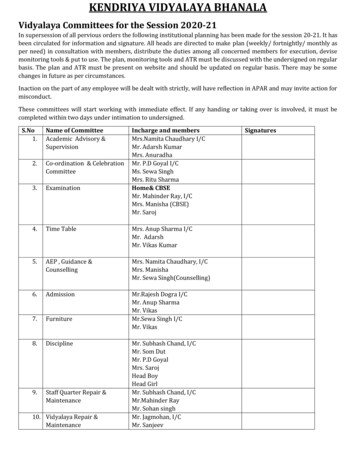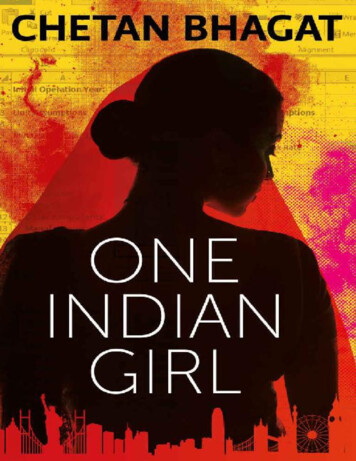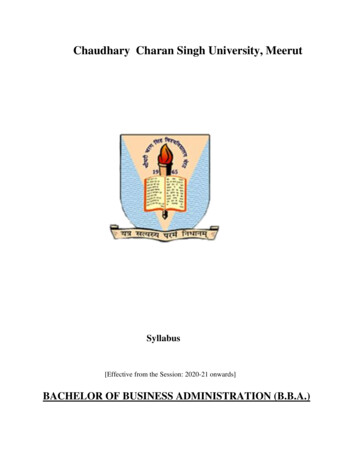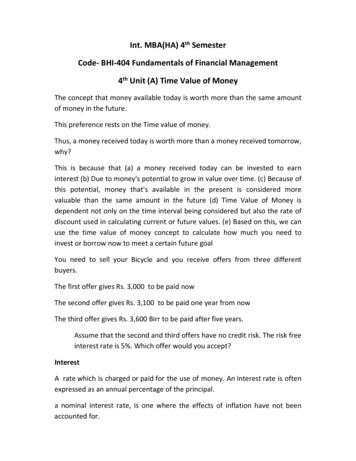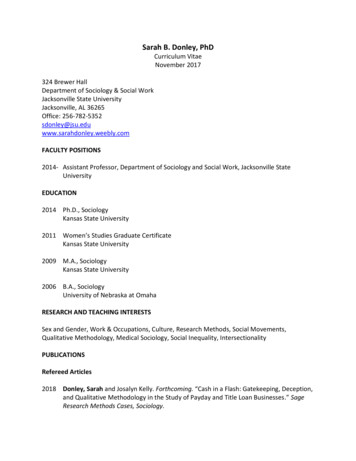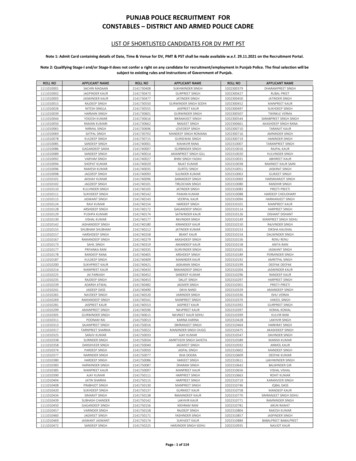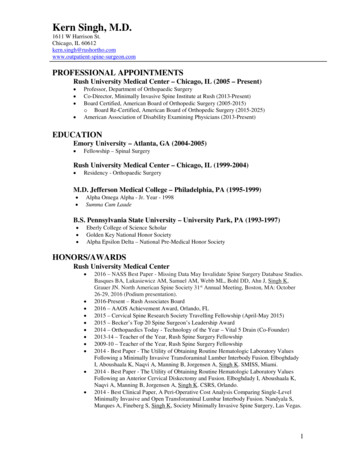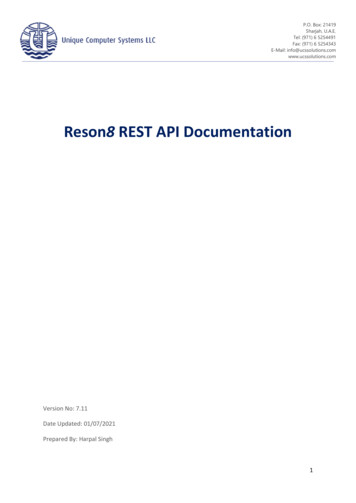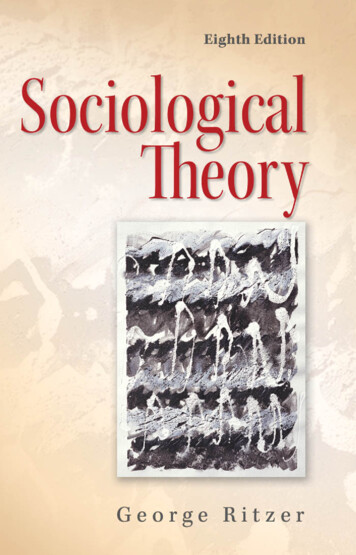
Transcription
Sociological Theoryrit11676 fm i-xx.indd i4/14/10 3:12:51 PM
This page intentionally left blank
Eighth EditionSociological TheoryGeorge RitzerUniversity of Marylandrit11676 fm i-xx.indd iii4/14/10 3:12:51 PM
SOCIOLOGICAL THEORY, EIGHTH EDITIONPublished by McGraw-Hill, a business unit of The McGraw-Hill Companies, Inc., 1221 Avenue of theAmericas, New York, NY 10020. Copyright 2011 by The McGraw-Hill Companies, Inc. All rightsreserved. Previous editions 2008, 2004, and 2000. No part of this publication may be reproduced ordistributed in any form or by any means, or stored in a database or retrieval system, without the priorwritten consent of The McGraw-Hill Companies, Inc., including, but not limited to, in any networkor other electronic storage or transmission, or broadcast for distance learning.Some ancillaries, including electronic and print components, may not be available to customers outsidethe United States.This book is printed on acid-free paper.1 2 3 4 5 6 7 8 9 0 DOC/DOC 1 0 9 8 7 6 5 4 3 2 1 0ISBN:978-0-07-811167-9MHID: 0-07-811167-6Vice President & Editor-in-Chief: Michael RyanVice President EDP/Central Publishing Services: Kimberly Meriwether DavidSenior Sponsoring Editor: Gina BoedekerExecutive Marketing Manager: Pamela S. CooperManaging Editor: Nicole BridgeProject Manager: Erin MelloyDesign Coordinator: Brenda A. RolwesCover Designer: Studio Montage, St. Louis, MissouriLead Photo Editor: Alexandra AmbroseCover Credit: Farinaz Taghavi/Getty ImagesBuyer: Nicole BaumgartnerCompositor: Glyph InternationalTypeface: 10/12 Times RomanPrinter: R. R. DonnelleyAll credits appearing on page or at the end of the book are considered to be an extensionof the copyright page.Library of Congress Cataloging-in-Publication DataRitzer, George.Sociological theory / George Ritzer.—8th ed.p. cm.Includes bibliographical references and index.ISBN 978-0-07-811167-9 (alk. paper)1. Sociology. 2. Sociologists—Biography I. Title.HM585.R57 2010301.01—dc222010006523www.mhhe.comrit11676 fm i-xx.indd iv4/14/10 3:12:58 PM
About the AuthorGeorge Ritzer is Distinguished University Professor at the University of Maryland,where he has also been a Distinguished Scholar-Teacher and received a TeachingExcellence Award. In 2000, he received the Distinguished Contributions to TeachingAward of the American Sociological Association, and in 2004, he received an honorary doctorate from LaTrobe University in Melbourne, Australia.Dr. Ritzer has served as Chair of the American Sociological Association’s Sections on Theoretical Sociology and Organizations and Occupations. He held theUNESCO Chair in Social Theory at the Russian Academy of Sciences and a FulbrightHays Chair at York University in Canada, and he received a Fulbright-Hays award tothe Netherlands. He was Scholar-in-Residence at the Netherlands Institute for AdvancedStudy and at the Swedish Collegium for Advanced Study in the Social Sciences.Professor Ritzer’s main theoretical interests lie in metatheory and in appliedsocial theory. In metatheory, his contributions include Sociology: A Multiple ParadigmScience (1975, 1980), Toward an Integrated Sociological Paradigm (1981), andMetatheorizing in Sociology (1991). George Ritzer is perhaps best known, however,for The McDonaldization of Society (5th ed., 2008), translated into more than a dozenlanguages, and for several related books (also with a number of translations), including Expressing America: A Critique of the Global Credit Card Society (1995), Enchanting a Disenchanted World: Revolutionizing the Means of Consumption (2nd ed.,2005), The Globalization of Nothing 2 (2007), and the forthcoming (with Craig Lair)Outsourcing: Globalization and Beyond. He edited the two-volume Encyclopedia ofSocial Theory (2005), the eleven-volume Blackwell Encyclopedia of Sociology (2007),and The Blackwell Companion to Globalization (2007), and he is the founding editorof the Journal of Consumer Culture.In 2010, McGraw-Hill published the third edition of Professor Ritzer’sContemporary Sociological Theory and Its Classic Roots: The Basics. Also in 2010,McGraw-Hill published the sixth edition of Classical Sociological Theory. The lattertext, as well as this one, have been translated into a number of languages.vrit11676 fm i-xx.indd v4/14/10 3:13:05 PM
Sociological Theoryrit11676 fm i-xx.indd i4/14/10 3:12:51 PM
To David,With Loverit11676 fm i-xx.indd vi4/14/10 3:13:06 PM
Brief ContentsBiographical and Autobiographical Sketches xviPreface xviiiPART IClassical Sociological Theory 1CHAPTER 1A Historical Sketch of Sociological Theory: The Early Years 1CHAPTER 2Karl Marx 43CHAPTER 3Emile Durkheim 76CHAPTER 4Max Weber 112CHAPTER 5Georg Simmel 158PART IIModern Sociological Theory: The Major Schools 189CHAPTER 6A Historical Sketch of Sociological Theory: The Later Years 189CHAPTER 7Structural Functionalism, Neofunctionalism, and ConflictTheory 236CHAPTER 8Varieties of Neo-Marxian Theory 277CHAPTER 9Systems Theory 331CHAPTER 10Symbolic Interactionism 351CHAPTER 11Ethnomethodology 391CHAPTER 12Exchange, Network, and Rational Choice Theories 416CHAPTER 13Contemporary Feminist Theory 454viirit11676 fm i-xx.indd vii4/14/10 3:13:06 PM
viiiBrief ContentsPART IIICHAPTER 14PART IVRecent Integrative Developments in Sociological Theory 499Micro-Macro and Agency-Structure Integration 499From Modern to Postmodern Social Theory (and Beyond) 547CHAPTER 15Contemporary Theories of Modernity 547CHAPTER 16Globalization Theory 574CHAPTER 17Structuralism, Poststructuralism, and PostmodernSocial Theory 605CHAPTER 18Cutting-Edge Developments in Contemporary Theory 645Appendix A-1References R-1Credits C-1Name Index I-1Subject Index I-13rit11676 fm i-xx.indd viii4/14/10 3:13:06 PM
ContentsBiographical and Autobiographical Sketches xviPreface xviiiClaude Henri Saint-Simon(1760–1825) 14Auguste Comte (1798–1857) 15PART I Classical SociologicalTheory 1CHAPTER 1A Historical Sketch ofSociological Theory: TheEarly Years 1Introduction 2Social Forces in the Development ofSociological Theory 5Political Revolutions 5The Industrial Revolution and the Riseof Capitalism 5The Rise of Socialism 6Feminism 6Urbanization 7Emile Durkheim (1858–1917) 19The Development of GermanSociology 21The Roots and Nature of the Theoriesof Karl Marx (1818–1883) 21The Roots and Nature of the Theoriesof Max Weber (1864–1920) andGeorg Simmel (1858–1918) 26The Origins of British Sociology 32Political Economy, Ameliorism, andSocial Evolution 34Herbert Spencer (1820–1903) 36The Key Figure in Early ItalianSociology 39Turn-of-the-Century Developments inEuropean Marxism 40Religious Change 7The Growth of Science 8Intellectual Forces and the Rise ofSociological Theory 8The Enlightenment 8The Conservative Reaction to theEnlightenment 9The Development of FrenchSociology 11Alexis de Tocqueville(1805–1859) 11CHAPTER 2Karl Marx 43Introduction 43The Dialectic 45Dialectical Method 46Fact and Value 46Reciprocal Relations 46Past, Present, Future 47No Inevitabilities 47Actors and Structures 48ixrit11676 fm i-xx.indd ix4/14/10 3:13:06 PM
xContentsHuman Potential 48Labor 52Alienation 53The Structures of CapitalistSociety 56Early and Late Durkheimian Theory 97Theory of Religion—The Sacred and theProfane 98Why Primitive? 100Totemism 100Commodities 57Sociology of Knowledge 101Fetishism of Commodities 58Collective Effervescence 102Capital, Capitalists, and theProletariat 59Moral Education and SocialReform 103Exploitation 60Morality 104Class Conflict 62Moral Education 105Capitalism as a Good Thing 64Occupational Associations 106Materialist Conception of History 65Cultural Aspects of CapitalistSociety 67Criticisms 107Functionalism and Positivism 107Other Criticisms 108Ideology 67Religion 70CHAPTER 4Marx’s Economics: A Case Study 70Communism 73Criticisms 73Max Weber 112Methodology 113History and Sociology 113Verstehen 116Causality 118CHAPTER 3Emile Durkheim 76Introduction 76Social Facts 77Material and Nonmaterial SocialFacts 79Types of Nonmaterial Social Facts 80The Division of Labor in Society 84Mechanical and Organic Solidarity 85Dynamic Density 88Repressive and Restitutive Law 89Normal and Pathological 90Justice 91Suicide 92The Four Types of Suicide 93Suicide Rates and Social Reform 96The Elementary Forms of ReligiousLife 97rit11676 fm i-xx.indd xIdeal Types 119Values 121Substantive Sociology 124What Is Sociology? 124Social Action 125Class, Status, and Party 127Structures of Authority 128Rationalization 136Religion and the Rise ofCapitalism 146Criticisms 154CHAPTER 5Georg Simmel 158Primary Concerns 158Levels and Areas of Concern 159Dialectical Thinking 162Individual Consciousness 1644/14/10 3:13:06 PM
xiContentsSocial Interaction (“Association”) 165Interaction: Forms and Types 166Social Structures 171Objective Culture 172The Philosophy of Money 174Money and Value 175Money, Reification, andRationalization 176Negative Effects 178The Tragedy of Culture 179Secrecy: A Case Study in Simmel’sSociology 181Secrecy and Social Relationships 182Other Thoughts on Secrecy 184Criticisms 185Structural Functionalism: Peakand Decline 214Radical Sociology in America: C. WrightMills 214The Development of Conflict Theory 215The Birth of Exchange Theory 217Dramaturgical Analysis: The Work ofErving Goffman 218The Development of Sociologies ofEveryday Life 219The Rise and Fall (?) of MarxianSociology 220The Challenge of Feminist Theory 222Structuralism and Poststructuralism 223Late-Twentieth-Century Developmentsin Sociological Theory 224Micro-Macro Integration 224Agency-Structure Integration 224PART II Modern Sociological Theory:The Major Schools 189CHAPTER 6A Historical Sketch ofSociological Theory: TheLater Years 189Early American Sociological Theory 190Politics 190Social Change and IntellectualCurrents 192The Chicago School 199Women in Early Sociology 205W.E.B. Du Bois and Race Theory 206Sociological Theory toMidcentury 207The Rise of Harvard, the Ivy League,and Structural Functionalism 207The Chicago School in Decline 211Developments in Marxian Theory 212Karl Mannheim and the Sociology ofKnowledge 213Sociological Theory from Midcentury214rit11676 fm i-xx.indd xiTheoretical Syntheses 226Theories of Modernity andPostmodernity 226The Defenders of Modernity 226The Proponents of Postmodernity 227Theories to Watch in the EarlyTwenty-first Century 228Multicultural Social Theory, QueerTheory, and Critical Theories of Raceand Racism 228Postmodern and Post-Postmodern SocialTheories 230Theories of Consumption 231Theories of Globalization 231Actor-Network Theory 233Practice Theory 233CHAPTER 7Structural Functionalism,Neofunctionalism, andConflict Theory 236Structural Functionalism 237The Functional Theory of Stratificationand Its Critics 2384/15/10 10:39:15 AM
xiiContentsTalcott Parsons’s StructuralFunctionalism 240Robert Merton’s StructuralFunctionalism 252The Major Criticisms 258Neofunctionalism 260Conflict Theory 265The Work of Ralf Dahrendorf 265The Major Criticisms and Efforts toDeal with Them 269A More Integrative Conflict Theory 270CHAPTER 8Varieties of Neo-MarxianTheory 277Economic Determinism 277Hegelian Marxism 278Postmodern Marxian Theory 323After Marxism 326Criticisms of Post-Marxism 328CHAPTER 9Systems Theory 331Sociology and Modern SystemsTheory 331Gains from Systems Theory 331Some General Principles 332Applications to the Social World 333Niklas Luhmann’s General SystemTheory 335Autopoietic Systems 336Society and Psychic Systems 338Double Contingency 339Evolution of Social Systems 341Georg Lukács 279Differentiation 342Antonio Gramsci 281Luhmann’s Sociology of Knowledge 347Critical Theory 282The Major Critiques of Social andIntellectual Life 282Criticisms 348CHAPTER 10The Major Contributions 286Criticisms of Critical Theory 290Symbolic Interactionism351The Major Historical Roots 351The Ideas of Jurgen Habermas 290Pragmatism 351Critical Theory Today: the Work of AxelHonneth 294Behaviorism 352Later Developments in CulturalCritique 296Neo-Marxian Economic Sociology 297Between Reductionism andSociologism 354The Ideas of George Herbert Mead 355The Priority of the Social 355Capital and Labor 297The Act 356Fordism and Post-Fordism 303Gestures 359Historically Oriented Marxism 305The Modern World-System 305Neo-Marxian Spatial Analysis 310The Production of Space 311Trialectics 314Spaces of Hope 315Post-Marxist Theory 317Analytical Marxism 318rit11676 fm i-xx.indd xiiSignificant Symbols 360Mind 362Self 362Society 367Symbolic Interactionism: The BasicPrinciples 369Capacity for Thought 369Thinking and Interaction 3704/14/10 3:13:07 PM
ContentsLearning Meanings and Symbols 371Action and Interaction 372Making Choices 372The Self and the Work of ErvingGoffman 373Groups and Societies 382Criticisms 384Toward a More Synthetic andIntegrative SymbolicInteractionism 385Redefining Mead 385xiiiDispute Resolution in MediationHearings 408Criticisms of TraditionalSociology 410Separated from the Social 410Confusing Topic and Resource 411Stresses and Strains inEthnomethodology 412Synthesis and Integration 413Ethnomethodology and theMicro-Macro Order 414Micro-Macro Integration 387The Future of SymbolicInteractionism 388CHAPTER 12CHAPTER 11Exchange Theory 416Ethnomethodology 391Defining Ethnomethodology 391The Diversification ofEthnomethodology 395Studies of Institutional Settings 395Exchange, Network,and Rational ChoiceTheories 416Behaviorism 416Rational Choice Theory 417The Exchange Theory of GeorgeHomans 420Conversation Analysis 396Peter Blau’s Exchange Theory 427Some Early Examples 397The Work of Richard Emerson andHis Disciples 431Breaching Experiments 397Accomplishing Gender 399Conversation Analysis 400Telephone Conversations: Identificationand Recognition 400Initiating Laughter 401Generating Applause 402Booing 403The Interactive Emergence of Sentencesand Stories 404Network Theory 437Basic Concerns and Principles 438A More Integrative Network Theory 440Network Exchange Theory 441Structural Power 442Strong and Weak Power Structures 443Rational Choice Theory 444Foundations of Social Theory 445Criticisms 451Integration of Talk and NonvocalActivities 405Doing Shyness (and Self-Confidence) 406Studies of Institutions 407Job Interviews 407Executive Negotiations 407Calls to Emergency Centers 408rit11676 fm i-xx.indd xiiiCHAPTER 13Contemporary FeministTheory 454Feminism’s Basic Questions 454Historical Framing: Feminism,Sociology, and Gender 4574/14/10 3:13:07 PM
xivContentsVarieties of Contemporary FeministTheory 460Gender Difference 461Sociological Theories: Institutional andInteractionist 464PART IV From Modern to PostmodernSocial Theory (and Beyond)547CHAPTER 15Gender Inequality 466Gender Oppression 470Structural Oppression 475Feminism and Postmodernism 485Feminist Sociological Theorizing 488A Feminist Sociology ofKnowledge 488The Macro-Social Order 490The Micro-Social Order 492Subjectivity 495Contemporary Theoriesof Modernity 547Classical Theorists on Modernity 547The Juggernaut of Modernity 549Modernity and Its Consequences 551Modernity and Identity 554Modernity and Intimacy 555The Risk Society 556Creating the Risks 557Coping with the Risks 558The Holocaust and Liquid Modernity559A Product of Modernity 559PART III Recent IntegrativeDevelopments in SociologicalTheory 499CHAPTER 14Micro-Macro andAgency-StructureIntegration 499The Role of Bureaucracy 560The Holocaust and Rationalization 561Liquid Modernity 563Modernity’s Unfinished Project 564Habermas versus Postmodernists 568Informationalism and the NetworkSociety 569Micro-Macro Integration 500Micro-Macro Extremism 500The Movement toward Micro-MacroIntegration 501CHAPTER 16Examples of Micro-MacroIntegration 502Major Contemporary Theorists onGlobalization 576Back to the Future: Norbert Elias’sFigurational Sociology 510Agency-Structure Integration 520Major Examples of Agency-StructureIntegration 521Major Differences in the AgencyStructure Literature 542Agency-Structure and Micro-MacroLinkages: FundamentalDifferences 544rit11676 fm i-xx.indd xivGlobalization Theory 574Anthony Giddens on the “RunawayWorld” of Globalization 576Ulrich Beck, the Politics of Globalization,and Cosmopolitanism 577Zygmunt Bauman on the HumanConsequences of Globalization 579Cultural Theory 580Cultural Differentialism 580Cultural Convergence 583Cultural Hybridization 5884/14/10 3:13:07 PM
xvContentsEconomic Theory 591Queer Theory 645Transnational Capitalism 591What Is It? 646Empire 592Where Did It Come From? 648Political Theory 595Neoliberalism 598Critiquing Neoliberalism 601Other Theories 603CHAPTER 17Structuralism,Poststructuralism, andPostmodern SocialTheory 605Critiques and Potential Solutions 651Critical Theories of Race andRacism 652Actor-Network Theory, Posthumanism,and Postsociality 656Practice Theory 661APPENDIX Sociological Metatheorizingand a MetatheoreticalSchema for AnalyzingSociological Theory A-1Structuralism 606Roots in Linguistics 607Anthropological Structuralism: ClaudeLévi-Strauss 607Structural Marxism 608Poststructuralism 609The Ideas of Michel Foucault 611The Ideas of Giorgio Agamben 621Postmodern Social Theory 628Moderate Postmodern Social Theory:Fredric Jameson 632Extreme Postmodern Social Theory:Jean Baudrillard 637Postmodern Social Theory andSociological Theory 639Metatheorizing in Sociology A-1Pierre Bourdieu’s Reflexive SociologyA-5The Ideas of Thomas Kuhn A-7Sociology: A Multiple-ParadigmScience A-11The Social-Facts Paradigm A-11The Social-Definition Paradigm A-11The Social-Behavior Paradigm A-12Toward a More Integrated SociologicalParadigm A-12Levels of Social Analysis: An OverviewA-13Criticisms and Post-Postmodern SocialTheory 640References R-1CHAPTER 18rit11676 fm i-xx.indd xvCutting-EdgeDevelopments inContemporary Theory 645Credits C-1Name Index I-1Subject Index I-134/14/10 3:13:07 PM
Biographical andAutobiographical SketchesAbdel Rahman Ibn-Khaldun 4Alexis de Tocqueville 12Auguste Comte 16Sigmund Freud 33Herbert Spencer 38Karl Marx 50Emile Durkheim 86Max Weber 114Georg Simmel 160Thorstein Veblen 196Joseph Schumpeter 198Robert Park 202W.E.B. Du Bois 208C. Wright Mills 216Talcott Parsons 240Robert K. Merton 254Jeffrey C. Alexander 262Immanuel Wallerstein 306George Herbert Mead 356Erving Goffman 374Harold Garfinkel 392George Caspar Homans 418Peter M. Blau 426xvirit11676 fm i-xx.indd xvi4/14/10 3:13:08 PM
Biographical and Autobiographical SketchesxviiRichard Emerson 432James S. Coleman 446Dorothy E. Smith 476Patricia Hill Collins 482Randall Collins 508Norbert Elias 512Pierre Bourdieu 528Anthony Giddens 550Jurgen Habermas 566Michel Foucault 612George Ritzer A-8rit11676 fm i-xx.indd xvii4/14/10 3:13:08 PM
PrefaceThis new edition of Sociological Theory, like its seven predecessors, offers a comprehensive overview of the history of sociological theory from its inception to the latesttheoretical developments. My goal is to combine a discussion of the major classicaltheorists (Marx, Weber, Durkheim, and Simmel) with the most important contemporary theories and theorists. In one convenient volume, this book offers students ahandy overview of much of what they need to know about sociological theory, bothpast and present.As in previous editions, in-depth discussions of theories (often enlivened withexamples) are accompanied by informative and—I believe—engaging biographicalsketches of many of the most important thinkers in the history of sociology. Onceagain, Sociological Theory offers two historical chapters surveying the early historyof the field (Chapter 1) and recent developments (Chapter 6). These chapters providean overview that allows students to put the work of each theorist in its historical,social, and political context.The social world is a complex and difficult subject, and so are many of thetheories about it. I have striven to make theory interesting, relevant, and as clear andaccessible as possible.Changes in the Eighth EditionAs is always the case, I faced difficult decisions about what to add and what to cut.There are some important additions to this edition, but I took care to be sure that thetext did not grow long and cumbersome. Among the major changes/additions are thefollowing: The discussion of Marx’s economic theory (Chapter 2) has been restored inthis edition. A substantial discussion of work of the contemporary critical theorist AxelHonneth has been added to Chapter 8 following a discussion of his mentor,Jurgen Habermas. The discussion of Zygmunt Bauman’s work on modernity (Chapter 15) nowincludes a discussion of both his thinking on the Holocaust and on “liquidmodernity.” Coverage of the political approach to globalization (Chapter 16) has beenenhanced, and there is a new section on neoliberalism.xviiirit11676 fm i-xx.indd xviii4/14/10 3:13:08 PM
Prefacexix In Chapter 17, following an overview of the work of Michel Foucault, amajor discussion of the work of the Italian social thinker Giorgio Agambenhas been added. There is a new biographical sketch on Joseph Schumpeter in Chapter 6. The text has been refreshed in many places, especially with the addition ofcitations to the most recent work on various theories.Cuts were made in various places, but no major theories or theorists were eliminated. Thus, the text is much as it always has been but is renewed once again. Thewonderful things about theory are both its continuity and its ever-changing character.I have tried to communicate those and other joys of sociological theory to readers inthe early stages of their exposure to it.AcknowledgmentsOnce again, I want to thank Patricia Lengermann and Gillian Niebrugge for revisingChapter 13, their pathbreaking chapter on contemporary feminist theory. Their chapternot only has made this book much stronger but also has had a strong influence ontheorizing independent of the book. I also thank Matthias Junge for his contributionto the section on Niklas Luhmann (in Chapter 9) and Mike Ryan for his on queertheory (in Chapter 18). Thanks also to Jillet Sam for her assistance in the preparationof this edition. Unfortunately, Doug Goodman, coauthor of the previous edition, wasunable to participate in this new edition. However, many of his contributions continueto be found in this text. Thanks, as well, to those at McGraw-Hill including GinaBoedeker, Nicole Bridge, and Craig Leonard.Thanks also go to a panel of reviewers whose comments and suggestions helpedto make this a better book:Chris Faircloth, Xavier University of LouisianaDiane Kayongo-Male, South Dakota State UniversityMike Ryan, University of Maryland–College ParkBrian Lowe, SUNY College at OneontaBrenda Chaney, Ohio State University at MarionRobert Carrothers, Ohio Northern UniversityKimberly Alexander, Lock Haven UniversityWalter Harper, University of Rhode IslandJohn Bartkowski, University of Texas at San AntonioDavid Gibson, University of PennsylvaniaJason Jimerson, Franklin CollegeLarry Ridener, Pfeiffer UniversityGeorge Ritzerrit11676 fm i-xx.indd xix4/14/10 3:13:08 PM
This page intentionally left blank
PARITClassical Sociological TheoryCHAPTER1A Historical Sketch of SociologicalTheory: The Early YearsChapter OutlineIntroductionSocial Forces in the Development of Sociological TheoryIntellectual Forces and the Rise of Sociological TheoryThe Development of French SociologyThe Development of German SociologyThe Origins of British SociologyThe Key Figure in Early Italian SociologyTurn-of-the-Century Developments in European MarxismA useful way to begin a book designed to introduce the range of sociological theoryis with several one-line summaries of various theories: The modern world is an iron cage of rational systems from which there is noescape. Capitalism tends to sow the seeds of its own destruction. The modern world has less moral cohesion than earlier societies had. The city spawns a particular type of personality. In their social lives, people tend to put on a variety of theatricalperformances. The social world is defined by principles of reciprocity in give-and-takerelationships. People create the social worlds that ultimately come to enslave them. People always retain the capacity to change the social worlds that constrain them.1rit11676 ch01 001-042.indd 14/14/10 3:01:24 PM
2Part IClassical Sociological Theory Society is an integrated system of social structures and functions. Society is a “juggernaut” with the ever-present possibility of running amok. Although it appears that the Western world has undergone a process ofliberalization, in fact it has grown increasingly oppressive. The world has entered a new postmodern era increasingly defined by theinauthentic, the fake, by simulations of reality. Paradoxically, globalization is associated with the worldwide spread of“nothing.” Nonhuman objects are increasingly seen as key actors in networks.This book is devoted to helping the reader better understand these and many othertheoretical ideas, as well as the larger theories from which they are drawn.IntroductionPresenting a history of sociological theory is an important task (S. Turner, 1998), butbecause I devote only two chapters (1 and 6) to it, what I offer is a highly selectivehistorical sketch (Giddens, 1995). The idea is to provide the reader with a scaffoldingwhich should help in putting the later detailed discussions of theorists and theories ina larger context. As the reader proceeds through the later chapters, it will prove useful to return to these two overview chapters and place the discussions in their context.(It will be especially useful to glance back occasionally to Figures 1.1 and 6.1, whichare schematic representations of the histories covered in those chapters.)The theories treated in the body of this book have a wide range of application,deal with centrally important social issues, and have stood the test of time. Thesecriteria constitute my definition of sociological theory.1A number of the theorists who are briefly discussed in Chapter 1 (for example,Herbert Spencer and Auguste Comte) will not receive detailed treatment later becausethey are of little more than historical interest. Other theorists (for example, Karl Marx,Max Weber, and Emile Durkheim) will be discussed in Chapter 1 in their historicalcontext, and they will receive detailed treatment later because of their continuingimportance. The focus is on the important theoretical work of sociologists or the workdone by individuals in other fields that has come to be defined as important in sociology. To put it succinctly, this is a book about the “big ideas” in sociology that havestood the test of time (or promise to)—idea systems that deal with major social issuesand that are far-reaching in scope.We cannot establish the precise date when sociological theory began. Peoplehave been thinking about, and developing theories of, social life since early in history.1These three criteria constitute my definition of sociological theory. Such a definition stands in contrast to the formal,“scientific” definitions (Jasso, 2001) that often are used in theory texts of this type. A scientific definition might be thata theory is a set of interrelated propositions that allows for the systematization of knowledge, explanation, and predictionof social life and the generation of new research hypotheses (Faia, 1986). Although such a definition has a number ofattractions, it simply does not fit many of the idea systems that are discussed in this book. In other words, most classical(and contemporary) theories fall short on one or more of the formal components of theory, but they are nonethelessconsidered theories by most sociologists.rit11676 ch01 001-042.indd 24/14/10 3:01:27 PM
rit11676 ch01 001-042.indd e ReactionEnlightenmentMontesquieu (1689–1755) de Bonald (1754–1840)de Maistre (1753–1821)Rousseau 805–1859)Comte(1798–1857)GermanyHegel (1720–1831)Young 7)EconomicHegelian MarxistsMarx (1818–1883) Determinists LukacsKautsky(1885–1971)(1854–1938)German HistoricismDilthey (1833–1911)Kant (1724–1804)IndustrialRevolutionand the riseof Simmel(1858–1918)ItalyRise ofsocialismPareto (1848–1923)Mosca (1858–1941)FeminismGreat BritainPolitical EconomySmith (1723–1790)UrbanizationReligiouschangeRicardo (1772–1823)Evolutionary TheorySpencer (1820–1903)United StatesGrowth ofscience34/14/10 3:01:28 PMFIGURE 1.1 Sociological Theory: The Early YearsVeblen (1857–1929)DuBois (1868–1963)Schumpeter (1883–1950)
4Part IClassical Sociological TheoryA BDEL R AHMAN I BN -K HALDUNA Biographical SketchThere is a tendency to think of sociology as exclusively acomparatively modern, Western phenomenon. In fact,however, scholars were developing sociological ideas andtheories long ago and in other parts of the world. Oneexample is Abdel Rahman Ibn-Khaldun.Ibn-Khaldun was born in Tunis, North Africa, on May 27, 1332 (Faghirzadeh,1982). Born to an educated family, Ibn-Khaldun was schooled in the Koran (theMuslim holy book), mathematics, and history. In his lifetime, he served a varietyof sultans in Tunis, Morocco, Spain, and Algeria as ambassador, chamberlain, andmember of the scholars’ council. He also spent two years in prison in Moroccofor his belief that state rulers were not divine leaders. After approximately twodecades of political activity, Ibn-Khaldun returned to North Africa, where heundertook an intensive five-year period of study and writing. Works producedduring this period increased his fame and led to a lectureship at the center ofIslamic study, Al-Azhar Mosque University in Cairo. In his well-attended lectureson society and sociology, Ibn-Khaldun stressed the importance of linking sociological thought and historical observation.By the time he died in 1406, Ibn-Khaldun had produced a corpus of workthat had many ideas in common with contemporary sociology. He was committedto the scientific study of society, empirical r
Biographical and Autobiographical Sketches xvi Preface xviii PART I Classical Sociological Theory 1 CHAPTER 1 A Historical Sketch of Sociological Theory: The Early Years 1 CHAPTER 2 Karl Marx 43 CHAPTER 3 Emile Durkheim 76 CHAPTER 4 Max Weber 112 CHAPTER 5 Georg Simmel 158 PART II Modern Sociological Theory: The Major Schools 189
